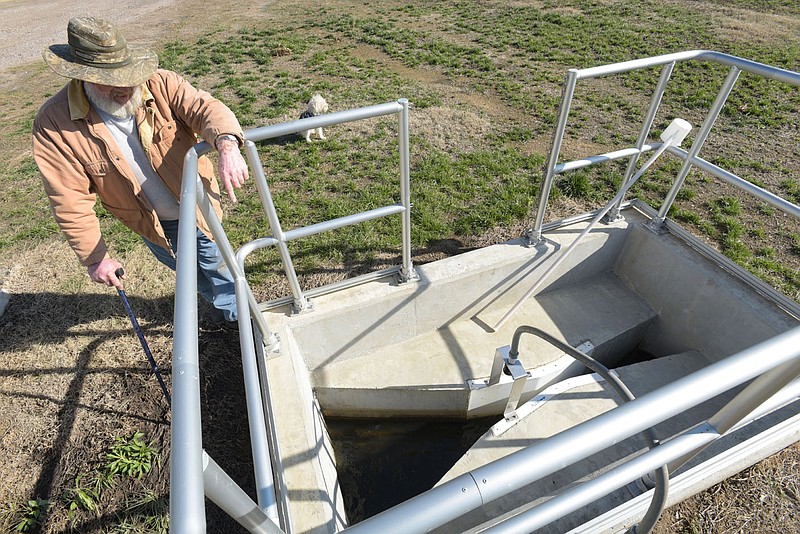HUNTINGTON -- A city of a few hundred people in south Sebastian County may consider filing for bankruptcy, according to its mayor.
Gary Lawrence, mayor of Huntington, said Monday that the situation came about as a result of the city struggling to make loan payments to U.S. Department of Agriculture Rural Development, as well as a decrease in monthly turnback money through the state due to a downturn in the city's population per the 2020 census.
"It's a possibility," Lawrence said. "I'm not saying we're going to go in bankruptcy, but it is an option."
Mark Hayes, executive director of the Arkansas Municipal League, said he doesn't believe a municipality in the state has ever declared bankruptcy, although there have been those that have gone through financial crises.
"In fact, a couple of years ago, maybe a decade or more, we had a problem with a city in southern Arkansas, Gould," Hayes said. "I asked a bankruptcy lawyer to look at it for them and the conclusion was that it would be unlikely that the law would allow a city to declare bankruptcy."
However, Hayes noted this isn't an "absolute" because no municipality has tried to declare bankruptcy, at least as far as he knows.
An article published in the Arkansas Democrat-Gazette in July 2010 states Gould filed for Chapter 9 bankruptcy in 2008. The bankruptcy was dismissed in federal bankruptcy court in May 2010.
THE PROJECT
Huntington's financial troubles stem from a project to upgrade its wastewater treatment plant at 400 W. Oak St., according to Lawrence. The city has had the plant since 1978.
Barry McCormick of the Van Buren-based Hawkins-Weir Engineers wrote in a Sept. 22 letter to the state Division of Environmental Quality obtained via a Freedom of Information Act request that the division informed Huntington in March 2015 about the need to address effluent violations at the Huntington Wastewater Treatment Plant.
Huntington and the division agreed to a consent administrative order in December 2016 that included a corrective action plan to resolve these violations and bring the facility back into compliance with the city's National Pollutant Discharge Elimination System permit, McCormick wrote.
McCormick said construction for improvements to the plant and in the city's sewage collection system was finished in September 2020. Certain post-construction issues were resolved by August 2021.
The order has been closed as of Oct. 22, according to a letter from the Division of Environmental Quality to Lawrence with the same date.
THE LOANS
Lawrence said Huntington at first budgeted more than $1.3 million for the project. This stemmed from a cost estimate detailed in a preliminary engineering report by Hawkins-Weir initially completed in May 2016 and last revised in July 2017.
A spokesperson with the Department of Agriculture said the department awarded Huntington a $798,000 loan and a $649,000 grant for the project on July 31, 2017. The city also raised its wastewater rates to help cover the initial cost in 2017 or 2018, according to Lawrence.
However, when the project was able to be let out for bids in early 2019, all the bids the city received were over the budgeted amount, according to Lawrence. This led to the city getting additional money through the Department of Agriculture.
The department awarded the city a $562,000 loan and a $460,000 grant on May 6, 2019, according to the department spokesman.
Lawrence said the overall cost of the project ended up being more than $2 million. The city's loans from the Department of Agriculture are to be paid back via monthly installments over the course of 40 years with interest. This started after the city received the second round of money.
THE CENSUS
Huntington's need to meet its loan payments for the project is compounded by a reported drop in the city's population, according to Lawrence. The 2010 census shows Huntington had a population of 635 as of April 1 of that year. The 2020 census, which was released last year, shows this declined to 490 by April 1, 2020.
Lawrence said because the amount of turnback money a municipality receives through the state is based on the population of the municipality, Huntington's population decrease has led to its income decreasing as well -- income it needs to maintain city operations.
"When they dropped our census, when that happened, that cut some funding that we allocate to water, street and general fund purposes," Lawrence said. "So that's just another hit that we've got to make up some way, and with a town the size we are, we have no tax base. We have very few businesses here in town, so we don't have other revenue other than our water bills and what turnback we get from the county and state sales tax."
Lawrence said the ongoing covid-19 pandemic that started in 2020 interfered with the collection of data for the latest census, with some people also refusing to fill out the census during this time.
GOING FORWARD
Lawrence said in light of these circumstances, Huntington has been in contact with the Department of Agriculture about possibly restructuring the city's loan payments so the city can make them. However, the department has so far been unwilling to change the payment schedule.
"We have struggled with the payments for a while, and we have made our payments and will continue to try to make the payments, but with the combination of the turnback and the climate that we're in, something's going to have to give," Lawrence said. "I mean, we've only got three employees. We don't have a police officer right now. So it's not like we've got some people we can lay off to compensate for it. I mean, we're at the bare-bones."
Lawrence said unless something changes, the city may have to file for bankruptcy, which isn't something he wants to do. If everything stays as it is, he estimated this may happen "probably within the next six months."
A Department of Agriculture spokesperson said the department will continue to work with Huntington on the wastewater treatment plant project.
"USDA always works with rural communities and other borrowers to help them complete projects the department finances to improve rural communities and help rural residents and businesses," the spokesperson said.
Hayes suggested Huntington work with Sebastian County to organize a meeting with the local governments around it, such as Greenwood and Mansfield, to find out what services are being duplicated and where money could be saved for all involved.
"Typically, that yields some things if everybody's willing to look at it objectively and take a real hard gaze at what they're doing and what their fellow local governmental officials are doing," Hayes said.
Hayes also said Huntington can contact the Arkansas Municipal League for assistance.
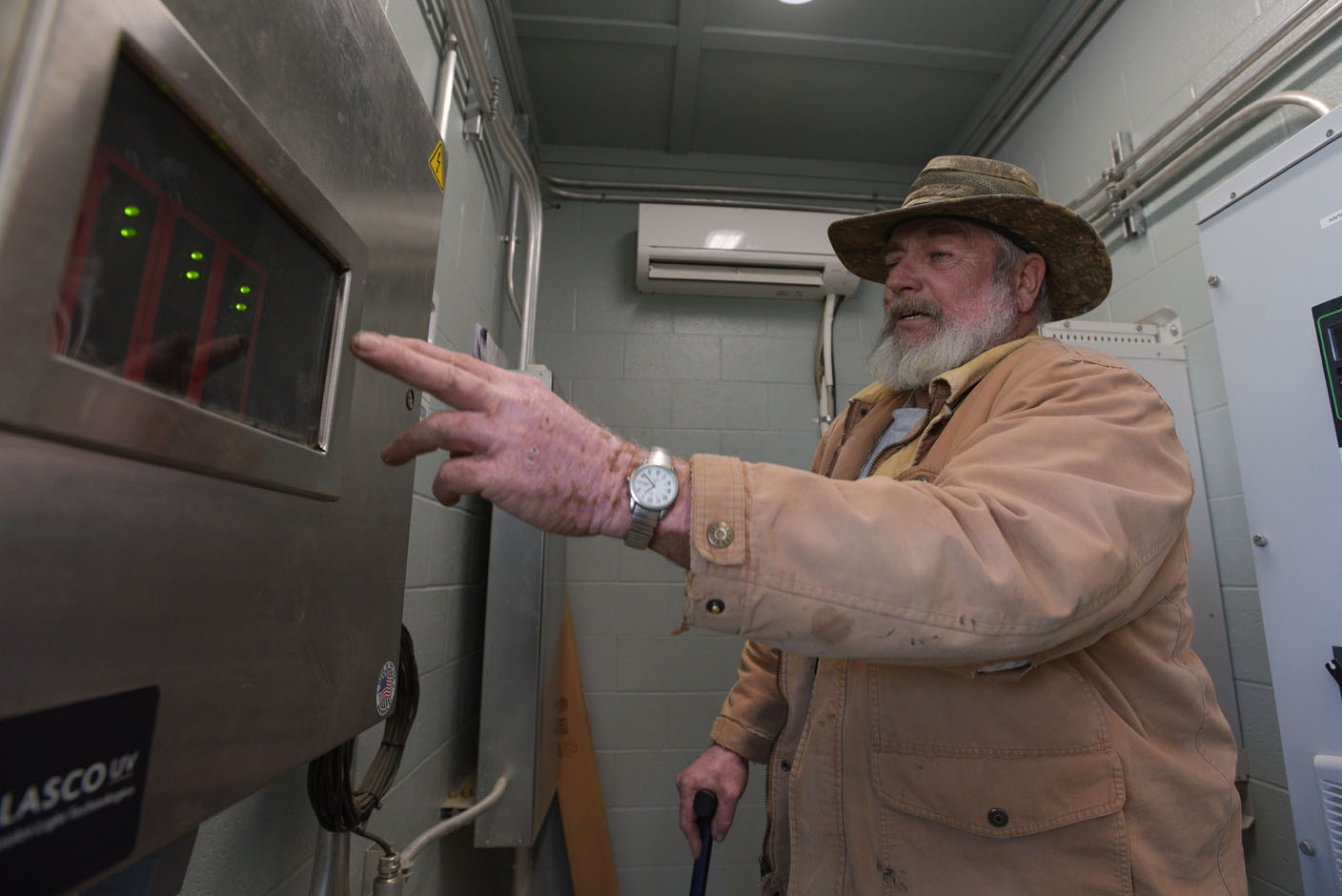 Arnold Elmore, public works director for the city of Huntington, works on Friday, Jan. 7, 2022, at the wastewater treatment plant in Huntington. Gary Lawrence, mayor of Huntington, said the city may consider filing for bankruptcy after it struggled to make loan payments to the U.S. Department of Agriculture in connection with a project to upgrade the wastewater treatment plant, as well as a decrease in turn back funds from the state due to a downturn in the city's population per the 2020 census.Visit nwaonline.com/220109Daily/ for today's photo gallery. (NWA Democrat-Gazette/Hank Layton)
Arnold Elmore, public works director for the city of Huntington, works on Friday, Jan. 7, 2022, at the wastewater treatment plant in Huntington. Gary Lawrence, mayor of Huntington, said the city may consider filing for bankruptcy after it struggled to make loan payments to the U.S. Department of Agriculture in connection with a project to upgrade the wastewater treatment plant, as well as a decrease in turn back funds from the state due to a downturn in the city's population per the 2020 census.Visit nwaonline.com/220109Daily/ for today's photo gallery. (NWA Democrat-Gazette/Hank Layton)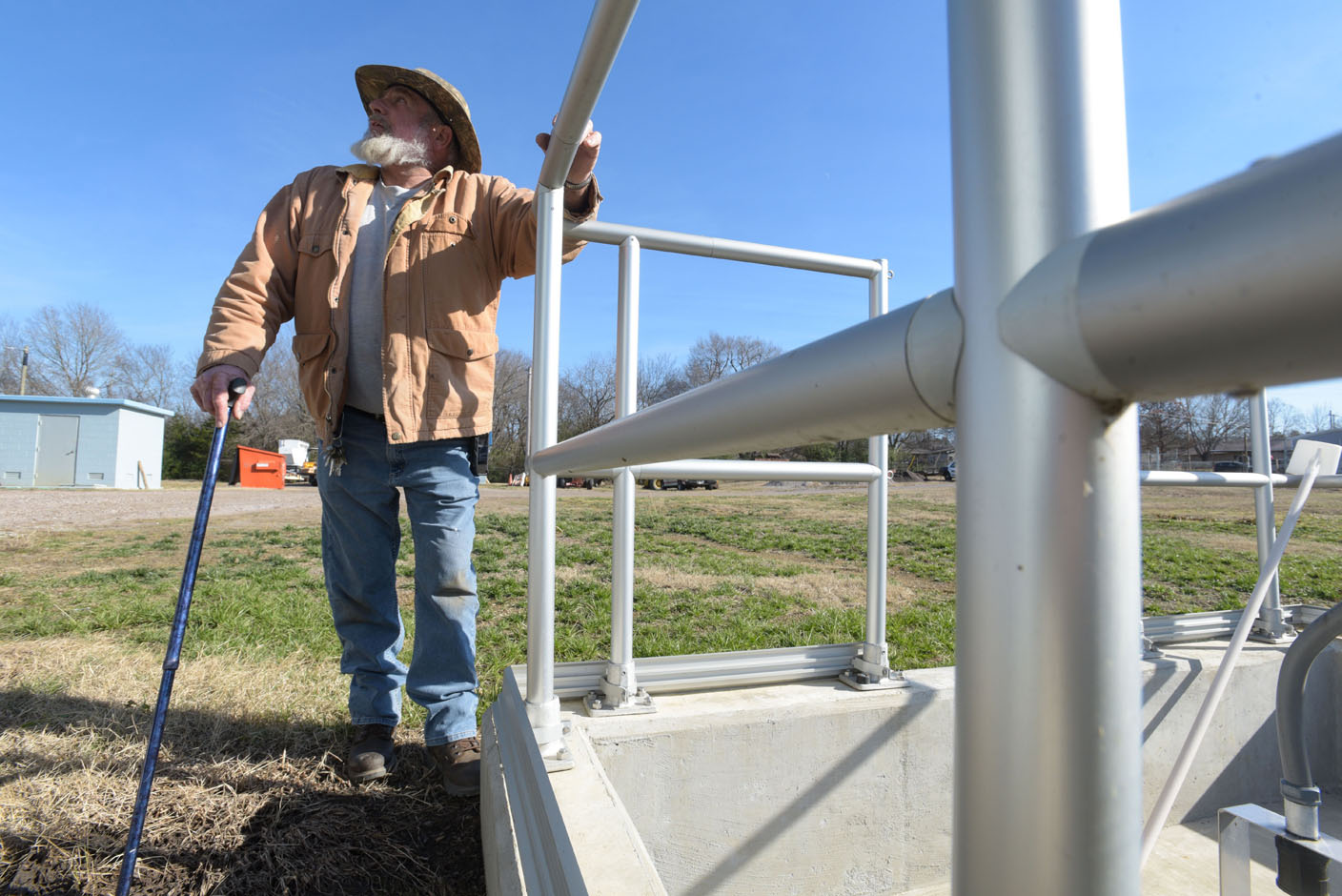 Arnold Elmore, public works director for the city of Huntington, works on Friday, Jan. 7, 2022, at the wastewater treatment plant in Huntington. Gary Lawrence, mayor of Huntington, said the city may consider filing for bankruptcy after it struggled to make loan payments to the U.S. Department of Agriculture in connection with a project to upgrade the wastewater treatment plant, as well as a decrease in turn back funds from the state due to a downturn in the city's population per the 2020 census.Visit nwaonline.com/220109Daily/ for today's photo gallery. (NWA Democrat-Gazette/Hank Layton)
Arnold Elmore, public works director for the city of Huntington, works on Friday, Jan. 7, 2022, at the wastewater treatment plant in Huntington. Gary Lawrence, mayor of Huntington, said the city may consider filing for bankruptcy after it struggled to make loan payments to the U.S. Department of Agriculture in connection with a project to upgrade the wastewater treatment plant, as well as a decrease in turn back funds from the state due to a downturn in the city's population per the 2020 census.Visit nwaonline.com/220109Daily/ for today's photo gallery. (NWA Democrat-Gazette/Hank Layton)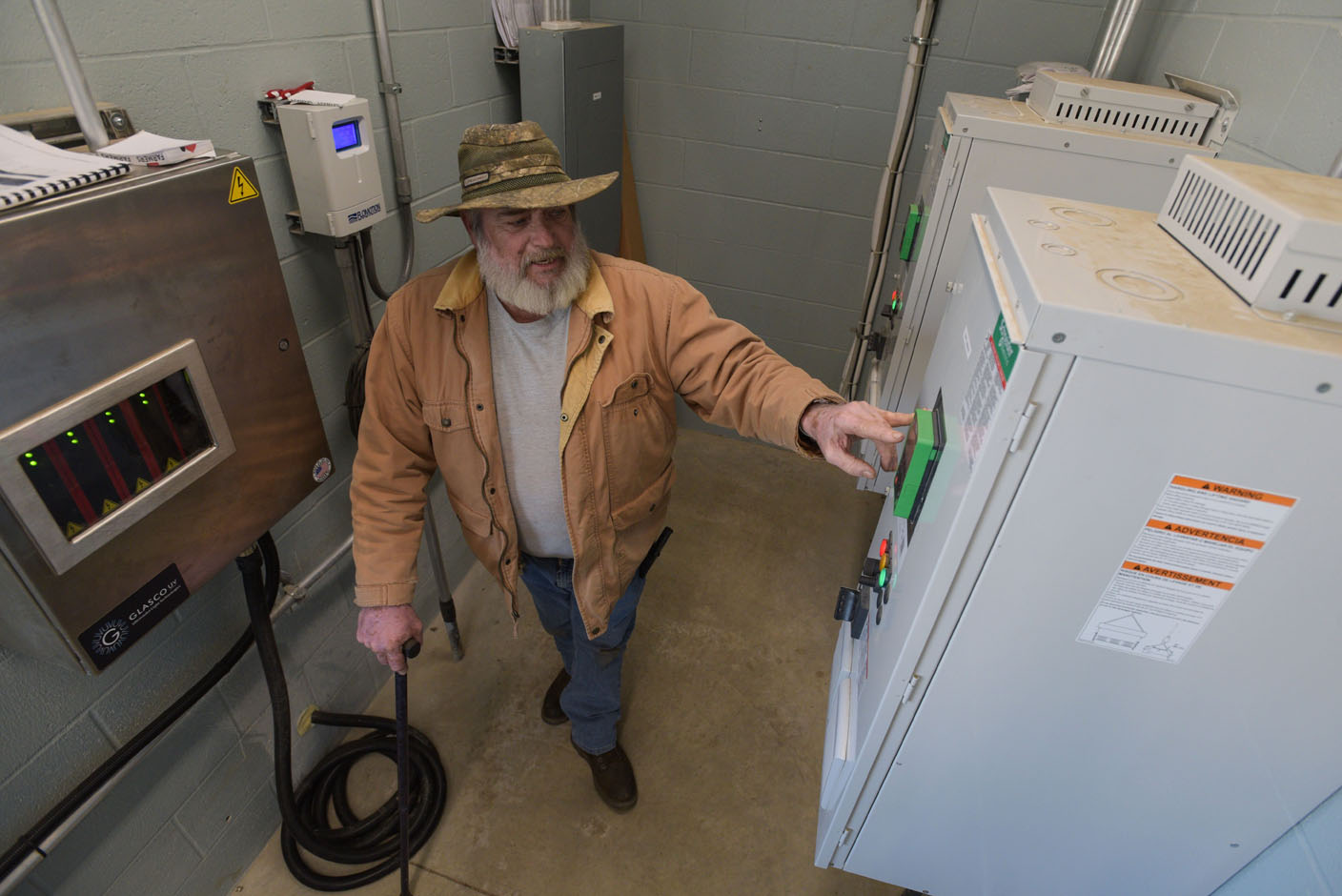 Arnold Elmore, public works director for the city of Huntington, works on Friday, Jan. 7, 2022, at the wastewater treatment plant in Huntington. Gary Lawrence, mayor of Huntington, said the city may consider filing for bankruptcy after it struggled to make loan payments to the U.S. Department of Agriculture in connection with a project to upgrade the wastewater treatment plant, as well as a decrease in turn back funds from the state due to a downturn in the city's population per the 2020 census.Visit nwaonline.com/220109Daily/ for today's photo gallery. (NWA Democrat-Gazette/Hank Layton)
Arnold Elmore, public works director for the city of Huntington, works on Friday, Jan. 7, 2022, at the wastewater treatment plant in Huntington. Gary Lawrence, mayor of Huntington, said the city may consider filing for bankruptcy after it struggled to make loan payments to the U.S. Department of Agriculture in connection with a project to upgrade the wastewater treatment plant, as well as a decrease in turn back funds from the state due to a downturn in the city's population per the 2020 census.Visit nwaonline.com/220109Daily/ for today's photo gallery. (NWA Democrat-Gazette/Hank Layton) The truck of Arnold Elmore, public works director for the city of Huntington, is seen on Friday, Jan. 7, 2022, at the wastewater treatment plant in Huntington. Gary Lawrence, mayor of Huntington, said the city may consider filing for bankruptcy after it struggled to make loan payments to the U.S. Department of Agriculture in connection with a project to upgrade the wastewater treatment plant, as well as a decrease in turn back funds from the state due to a downturn in the city's population per the 2020 census.Visit nwaonline.com/220109Daily/ for today's photo gallery. (NWA Democrat-Gazette/Hank Layton)
The truck of Arnold Elmore, public works director for the city of Huntington, is seen on Friday, Jan. 7, 2022, at the wastewater treatment plant in Huntington. Gary Lawrence, mayor of Huntington, said the city may consider filing for bankruptcy after it struggled to make loan payments to the U.S. Department of Agriculture in connection with a project to upgrade the wastewater treatment plant, as well as a decrease in turn back funds from the state due to a downturn in the city's population per the 2020 census.Visit nwaonline.com/220109Daily/ for today's photo gallery. (NWA Democrat-Gazette/Hank Layton)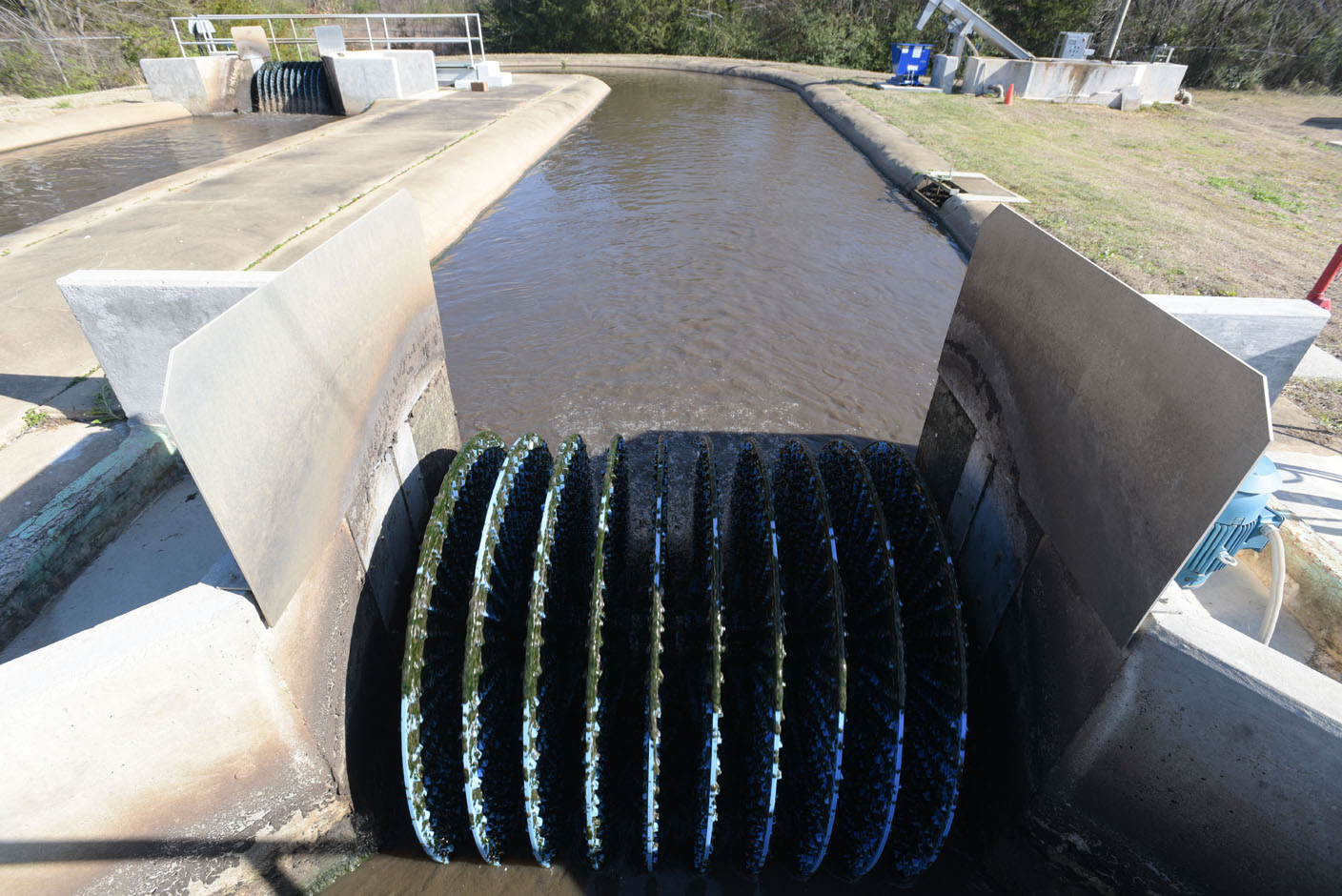 Separators divert water on Friday, Jan. 7, 2022, at the wastewater treatment plant in Huntington. Gary Lawrence, mayor of Huntington, said the city may consider filing for bankruptcy after it struggled to make loan payments to the U.S. Department of Agriculture in connection with a project to upgrade the wastewater treatment plant, as well as a decrease in turn back funds from the state due to a downturn in the city's population per the 2020 census.Visit nwaonline.com/220109Daily/ for today's photo gallery. (NWA Democrat-Gazette/Hank Layton)
Separators divert water on Friday, Jan. 7, 2022, at the wastewater treatment plant in Huntington. Gary Lawrence, mayor of Huntington, said the city may consider filing for bankruptcy after it struggled to make loan payments to the U.S. Department of Agriculture in connection with a project to upgrade the wastewater treatment plant, as well as a decrease in turn back funds from the state due to a downturn in the city's population per the 2020 census.Visit nwaonline.com/220109Daily/ for today's photo gallery. (NWA Democrat-Gazette/Hank Layton)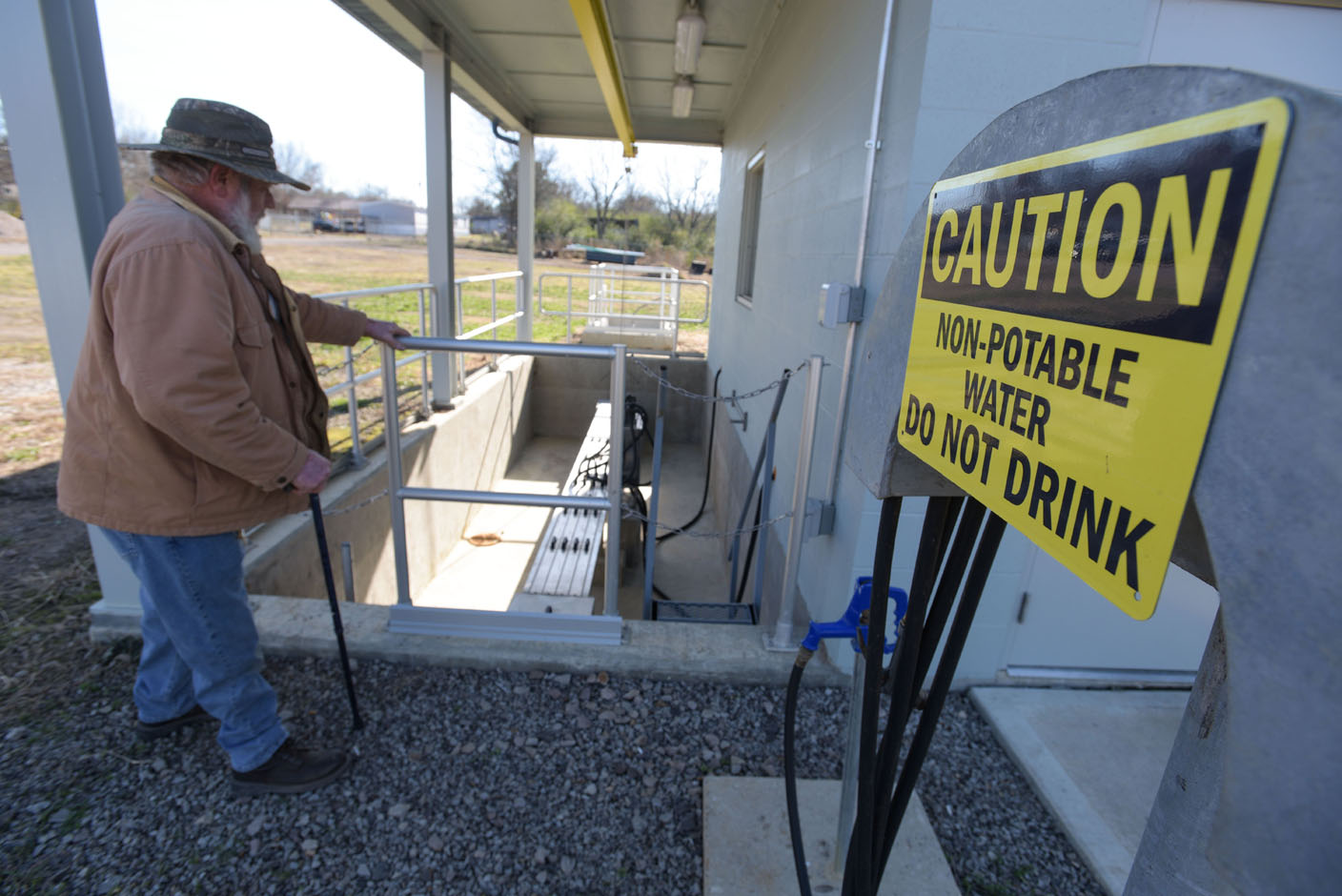 Arnold Elmore, public works director for the city of Huntington, works on Friday, Jan. 7, 2022, at the wastewater treatment plant in Huntington. Gary Lawrence, mayor of Huntington, said the city may consider filing for bankruptcy after it struggled to make loan payments to the U.S. Department of Agriculture in connection with a project to upgrade the wastewater treatment plant, as well as a decrease in turn back funds from the state due to a downturn in the city's population per the 2020 census.Visit nwaonline.com/220109Daily/ for today's photo gallery. (NWA Democrat-Gazette/Hank Layton)
Arnold Elmore, public works director for the city of Huntington, works on Friday, Jan. 7, 2022, at the wastewater treatment plant in Huntington. Gary Lawrence, mayor of Huntington, said the city may consider filing for bankruptcy after it struggled to make loan payments to the U.S. Department of Agriculture in connection with a project to upgrade the wastewater treatment plant, as well as a decrease in turn back funds from the state due to a downturn in the city's population per the 2020 census.Visit nwaonline.com/220109Daily/ for today's photo gallery. (NWA Democrat-Gazette/Hank Layton)
